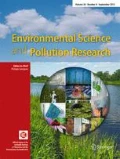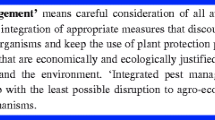Abstract
Promoting agrochemical reduction is a prerequisite for high-quality development of agriculture. It is still controversial whether Internet use can reduce pesticide use. This study uses the survey data of 670 vegetable growers of two provinces in China, Shandong and Shaanxi. Probit model and bootstrap method were used to analyze the impact of Internet use in reduction of pesticide application by farmers. Shallow use and deep use of the Internet were taken into account. On this basis, multiple mediating effects were tested on the following three aspects: information acquisition ability, awareness of green production, and e-commerce sales capability. The study found that shallow use and deep use of the Internet have a significant direct impact on pesticide reduction by farmers. Information acquisition ability, awareness of green production, and e-commerce sales capability all play a significant positive mediating role in the deep use of the Internet affecting pesticide reduction. However, in the process of shallow use of the Internet affecting pesticide reduction, only the mediating effect of green production awareness is significant. Concurrently, compared with the shallow use of the Internet, the deep use of the Internet has a significant positive impact on rural groups with weak human capital and weak social capital.


Similar content being viewed by others
Notes
Data Source: “Digital in 2019” report jointly released by We Are Social and Hootsuite in January 2019.
Data Source: “45th Statistical Report on Internet Development in China” released by China Internet Network Information Center in April 2020.
Data Source: China Rural Statistical Yearbook (1992–2018) and FAO database.
References
Aker JC (2011) Dial ‘A’ for agriculture: a review of information and communication technologies for agricultural extension in developing countries. Agric Econ 42(6):631–647
Aker JC, Ksoll C (2016) Can mobile phones improve agricultural outcomes? Evidence from a randomized experiment in Niger. Food Policy 60(4):44–51
Baorakis G, Kourgiantakis M, Migdalas A (2002) The impact of E-commerce on agro-food marketing: the case of agricultural cooperatives, firms and consumers in Crete. Br Food J 104(8):580–590
Bilali HE, Allahyari MS (2018) Transition towards sustainability in agriculture and food systems: role of information and communication technologies. Inf Process Agric 5(4):456–464
Bumblauskas D, Mann A, Dugan B, Rittmer J (2019) A block chain use case in food distribution: do you know where your food has been? Int J Inf Manag 52:102008. https://doi.org/10.1016/j.ijinfomgt.2019.09.004
Cole S, Fernando AN (2012) The value of advice: evidence from mobile phone-based agricultural extension. Harvard Business School Working Paper
Damalas AD, Khan M (2016) Farmers’ attitudes towards pesticide labels: implications for personal and environmental safety. Int J Pest Manag 62(4):319–325
Gao Y, Zhao D, Yu L, Yang H (2020) Influence of a new agricultural technology extension mode on farmers’ technology adoption behavior in China. J Rural Stud 76:173–183. https://doi.org/10.1016/j.jrurstud.2020.04.016
Goncalves G, Oliveira T, Cruz-Jesus F (2018) Understanding individual-level digital divide: evidence of an African country. Comput Hum Behav 87:276–291
Ho CC, Tseng SF (2006) From digital divide to digital inequality: the global perspective. Int J Int Enterp Manag 4(3):215–227
Jallow M, Awadh DG, Albaho MS, Devi VY, Binson M Thomas (2017) Pesticide risk behaviors and factors influencing pesticide use among farmers in Kuwait. Sci Total Environ 574:490–498
Kansiime MK, Alawy A, Allen C, Subharwal M, Jadhav A, Parr M (2019) Effectiveness of mobile agri-advisory service extension model: evidence from Direct2Farm program in India. World Dev Perspect 13:25–33
Khanal AR, Mishra AK (2016) Financial performance of small farm business households: the role of internet. China Agric Econ Rev 8(4):553–571
Kovács I, Husti I (2018) The role of digitalization in the agricultural 4.0—how to connect the industry 4.0 to agriculture? Hung Agric Eng 33:38–42
Lamichhane JR (2017) Pesticide use and risk reduction in European farming systems with IPM: an introduction to the special issue. Crop Prot 97:1–6
Liu E, Huang J (2013) Risk preferences and pesticide use by cotton farmers in China. J Dev Econ 103:202–215
Liu Y, Han W, Zhang Y, Li L, Wang J, Zheng L (2016) An Internet-of-Things solution for food safety and quality control: a pilot project in China. J Ind Inf Integr 3:1–7
Maredia MK, Reyes B, Ba MN, Dabire CL, Pittendrigh B, Bello-Bravo J (2017) Can mobile phone-based animated videos induce learning and technology adoption among low-literate farmers? A field experiment in Burkina Faso. Inf Technol Dev 24(3):429–460
Mittal S, Tripathi G (2009) Role of mobile phone technology in improving small farm productivity. Agric Econ Res Rev 22:451–459
Monfared N, Yazdanpanah M, Tavakoli K (2015) Why do they continue to use pesticides? The case of tomato growers in Boushehr Province in Southern Iran. J Agric Sci Technol 17:577–588
Preacher KJ, Rucker DD, Hayes AF (2007) Addressing moderated mediation hypotheses: theory, methods, and prescriptions. Multivar Behav Res 42(1):185–227
Shimamoto D, Yamada H, Gummert M (2015) Mobile phones and market information: evidence from rural Cambodia. Food Policy 57:135–141
Smith A, Goe WR, Kenney M, Paul C (2004) Computer and Internet use by Great Plains farmers. J Agric Resour Econ 29(3):481–500
Suchiradipta B (2018) Raj S (2018) The online culture of agriculture: exploring social media readiness of agricultural professionals. CSI Trans ICT 6(3–4):289–299
Wang Y, Wang Y, Huo X, Zhu Y (2015) Why some restricted pesticides are still chosen by some farmers in China? Empirical evidence from a survey of vegetable and apple growers. Food Control 51:417–424
Wyckhuys K, Bentley J, Lie R, Nghiem L, Fredrix M (2018) Maximizing farm-level uptake and diffusion of biological control innovations in today’s digital era. BioControl 63(1):133–148
Zadjali S, Morse S, Chenoweth J, Deadman M (2014) Factors determining pesticide use practices by farmers in the Sultanate of Oman. Sci Total Environ 476–477:505–512
Zhang X, Wan G, Zhang J (2019) Digital economy, inclusive finance and inclusive growth. Econ Res 8:71–86 (In Chinese)
Zhao L, Wang C, Gu H, Yue C (2018) Market incentive, government regulation and the behavior of pesticide application of vegetable farmers in China. Food Control 85:308–317
Zhong B, Yang F, Chen Y (2015) Information empowers vegetable supply chain: a study of information needs and sharing strategies among farmers and vendors. Comput Electron Agric 117:81–90
Zhu Q, Li Y, Geng Y, Qi Y (2013) Green food consumption intention, behaviors and influencing factors among Chinese consumers. Food Qual Prefer 28:279–286
Zhu Q, Bai J, Peng C, Zhu C (2019) Has informatization increased agricultural productivity? Chin Rural Econ 4:22–40 (In Chinese)
Acknowledgment
The authors are grateful to the National Natural Science Foundation of China (71933005) and the Research Project of Major Theoretical and Practical Issues in the Social Sciences Community of Shaanxi Province (2020Z028).
Author information
Authors and Affiliations
Corresponding author
Ethics declarations
Conflict of interest
The authors declare that they have no conflict of interest.
Additional information
Responsible Editor: Baojing Gu
Publisher’s note
Springer Nature remains neutral with regard to jurisdictional claims in published maps and institutional affiliations.
Rights and permissions
About this article
Cite this article
Zhao, Q., Pan, Y. & Xia, X. Internet can do help in the reduction of pesticide use by farmers: evidence from rural China. Environ Sci Pollut Res 28, 2063–2073 (2021). https://doi.org/10.1007/s11356-020-10576-8
Received:
Accepted:
Published:
Issue Date:
DOI: https://doi.org/10.1007/s11356-020-10576-8




